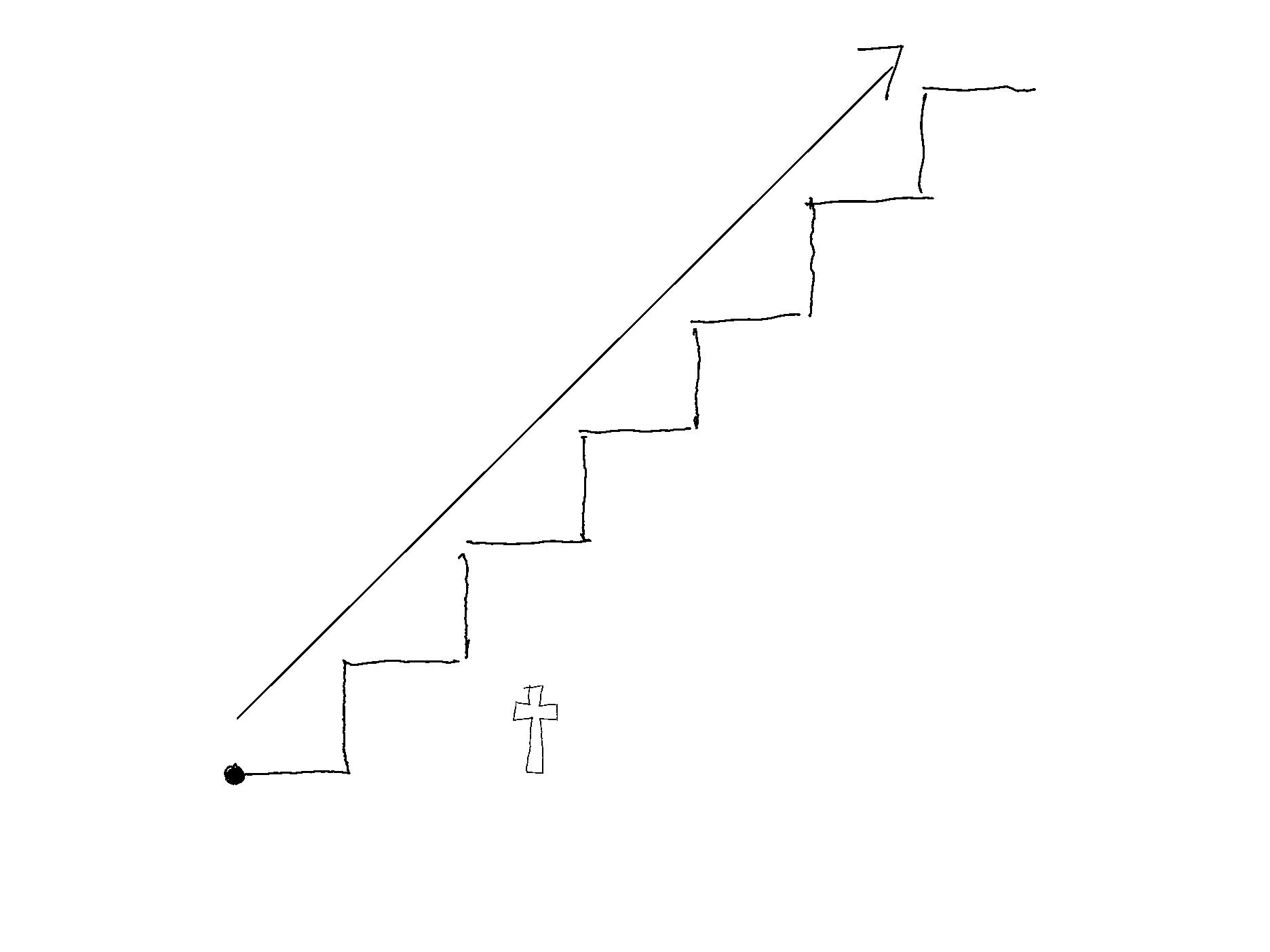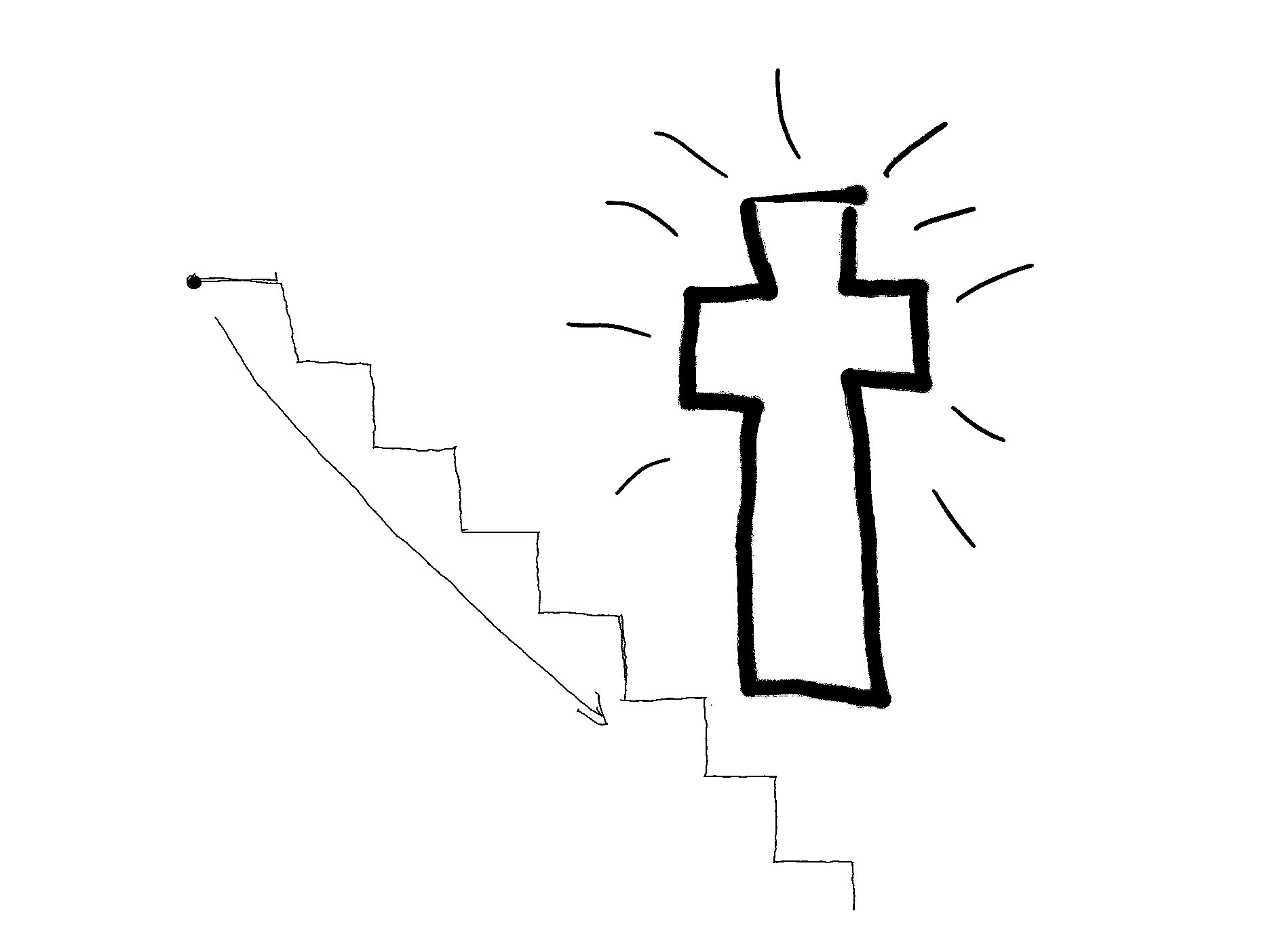Sanctification Explained Simply
What is Sanctification? That’s a $5 theological word for a lot of people. Simply put it's the Christian's growth in holiness. (See the excursus at the end of this article for a more theological definition and discussion).
But there’s a view of sanctification that I’ve found immensely helpful, one that my chaplain on the ship helped me understand.
There is a danger in sanctification—a false pride that can creep in. The old enemies of legalism and self-reliance can make the cross fade into a distant memory. This often happens when people see sanctification as a stairway upwards. They imagine that they were saved at a certain point, and as they climb the stairs of holiness, they become increasingly aware of their progress. They feel they’re getting better and better, seemingly ascending into heaven. Their self-perception becomes one of self-improvement.

Can you picture it? Stairs going upward, rising into the clouds, as the cross becomes smaller and smaller beneath them. Self-reliance and pride in their own holiness grow, while thankfulness and reliance on God seem to diminish. In their own eyes, they are sanctified. Sadly, to many around them, their pride and legalism can be seen a mile away.
I am convinced that this is the exact opposite of how the Spirit works to sanctify us. Sanctification isn’t a stairway upwards to higher and higher rungs of holiness. No, sanctification is a downward soul work.
Now imagine a different picture: Stairs descending downward, spiraling deeper through the heart. As the Holy Spirit confronts us with His Word and the situations in our lives, we see how much more we must die to sin. When He strengthens us to put away drunkenness, we rejoice in putting on sobriety. But then, He confronts us with the lust that resides in our hearts. And yet, the Spirit doesn’t leave us alone in that battle. He shows us the beauty of Jesus, and we see our sins for the putridness they are. With grief and hatred, we turn from them and turn unto God. We rejoice even more in the cross because we realize He saved us from ourselves. But the Spirit doesn’t stop. He will not stop. Those obvious sins of the flesh are confronted again and again—idolatry, hatred, contention, outbursts of wrath, heresies, murders, revelries, and the like. Each time, the Spirit shows us just how far from holiness we were by ourselves and how desperately we needed the cross.

This is a dangerous moment in the Christian life. Will the Christian think their renewal is finished? Will they believe they’ve reached the top of the sanctification ladder? Will they rest assured that they’ve climbed the hill and claimed ultimate victory? If so, the cross has become too small. They’ve underestimated the corruption of their hearts.
The Holy Spirit will not call for a ceasefire until our sanctification is fully realized on the other side of glory. Our view of the work of Christ and the radical nature of our sin must increase, not decrease, as we live our Christian life.
The Holy Spirit eventually comes after the respectable sins—those subtle, socially acceptable transgressions. He stirs up in us a hatred for how we are still like the world in our anxiety, discontent, impatience, thanklessness, pride, selfishness, rudeness, lack of self-control, irritability, suspicions, unkindness, judgmentalism, envy, jealousy, gossip, slander, and covetousness. As we go deeper and deeper into our hearts and the patterns of our thinking, we find that there is so much more radical work to be done. We need to confess our sins not less, but more. Our need for the blood of Jesus has not lessened! Our desire for glory increases because the Holy Spirit makes us more and more aware that we are not finished yet. But in this deeper awareness, something remarkable happens. As we look deeper into our need for sanctification, we are forced to look not to ourselves but upward. We see how glorious the finished work of Jesus is and how desperately we need the cross of Christ.

Picture this final image: A downward path leading into the depths of the heart, but with the cross radiating above, growing larger and more glorious as we descend. Progressive sanctification becomes not a drudgery of never-ending war against ourselves, but a grace-filled journey that reveals the depths of God’s love in sending Jesus to die for us, to rise from the dead, and to send His Holy Spirit.
Praise God for the powerful working of His Holy Spirit in your life, Christian. Have you ever felt like you’ve reached the top of the stairway? Do you find yourself less reliant on the cross? Never become dull to the dangers of sin. Stay vigilant. Stay sensitive to the prompting of the Holy Spirit as He works in your life. Remember, the downward road of sanctification magnifies the glorious sacrifice of our Lord. This downward renewal shows you just how deep and wide the love of Christ Jesus is for you.
A theological excursion on what the Westminster Larger Catechism says about sanctification.
"Sanctification is a work of God’s grace"
Sanctification is fundamentally the work of God. It is not something we accomplish on our own. Rather, it is the gracious work of God in our lives. We do not naturally deserve sanctification, but God, in His lovingkindness, chooses to sanctify us. This process is an expression of His undeserved grace toward us.
"Whereby they whom God hath before the foundation of the world chosen to be holy."
Sanctification is intended for God’s people—those whom He has chosen from eternity past. This choice is significant, as it highlights a key aspect of sanctification: we are "chosen to be holy." At its core, sanctification is about holiness, a moral separateness that sets us apart from the common for a royal purpose. Just as Abraham was set apart from all other people, Israel from all other nations, David from all other citizens, and Aaron as a priest, so too are Christians set apart for God’s glory.
In one sense, then, the Christian is already sanctified, having been chosen to be God’s people for His glory. However, while we may understand sanctification in this definitive sense, we often think of it in a temporal, ongoing process. The Larger Catechism addresses this when it says:
"Are in time through the powerful operation of his Spirit."
As we live our lives within the chronology of time, the Holy Spirit works powerfully within us. From the moment we are called, justified, and adopted, we are infused with grace and enabled to perform good works to God’s glory. The process of sanctification is not static; it is dynamic and ongoing.
But how does the Holy Spirit work to sanctify us over time?
"Applying the death and resurrection of Christ unto them, renewed in their whole man after the image of God."
The Holy Spirit applies to us the benefits of Christ's death and resurrection. Through this application, we receive the remission of sins, redemption, and the cleansing of our souls. Additionally, the Spirit gives us the living hope of resurrection and the justification that has been accomplished through Christ. This sanctifying work touches every part of our being, conforming us to the image of God. As we grow in righteousness and holiness, the old self is gradually put to death, and the new self, reflecting the image of Christ, is put on. This is the active, ongoing work of the Holy Spirit, sanctifying us in both body and soul.
"... Having the seeds of repentance unto life, and all other saving graces, put into their hearts, and those graces so stirred up, increased, and strengthened, as that they more and more die unto sin and rise unto newness of life."
We are not merely saved from wrath and then left to our own devices. The Holy Spirit places within our hearts the seeds of repentance and all other saving graces. These graces are not left dormant; they are actively stirred up, increased, and strengthened by the Spirit. As a result, we grow in our faith in Jesus Christ and our repentance unto life. Over time, we find Jesus increasingly wonderful and our sin increasingly loathsome. The Spirit's sanctifying work involves making us more holy, often through trials, tribulations, prosperity, and adversity alike.
